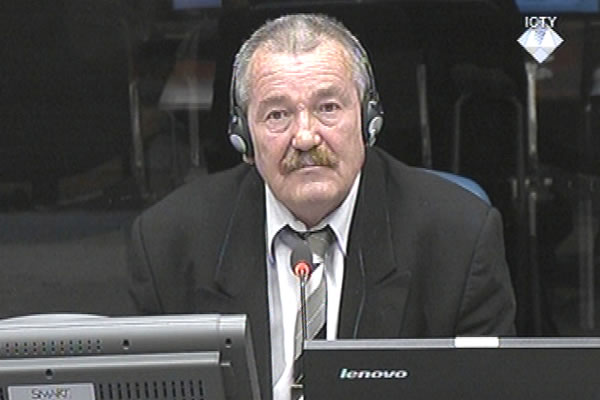Home
MLADIC’S WITNESS: MASSACRE IN VELAGICI ‘REVENGE FOR WORLD WAR II’
Nikola Vracar, former reserve policeman in Kljuc, was able to recall at the trial of Ratko Mladic that he had heard about the massacre in Biljani a day or two after the incident. This contradicted the witness’s claim in his statement to Mladic's defense that he had heard about the incident years later, during evidence in the Radoslav Brdjanin case
 Nikola Vracar, defence witness at Rako Mladic trial
Nikola Vracar, defence witness at Rako Mladic trial Nikola Vracar testified at the trial of Ratko Mladic. The former reserve policeman in the Kljuc Public Security Station described in the statement to the defense the attack of the Muslim forces on a Serb patrol in Krasulje on 27 May 1992. According to the witness, the attack marked the beginning of the war in Kljuc. Muslims and Croats left Kljuc ‘voluntarily’, the witness claimed in his statement to Mladic’s defense, and ‘because they feared war’. Kljuc is one of the six BH municipalities where, as alleged by the prosecution, the crimes against the non-Serbs reached the scale of genocide.
In the examination-in-chief, Vracar spoke about the massacre in Velagici on 1 June 1992 when 77 Muslim detainees were killed. The witness knew about the crime because ‘everybody was talking about it’. He was on sick leave and as a consequence, he didn’t learn any additional details. As he was questioned by defense counsel Branko Lukic, Vracar said that he ‘heard rumors’ about some Serbs in Velagici taking revenge on the Muslims for the Serb casualties in World War II.
In his statement to Mladic’s defense the witness said that he learned about the murder of 140 Muslims in the village of Biljani near Kljuc only when he testified in the case against Radoslav Brdjanin in 2003.
However, according to the transcript of his evidence in the Brdjanin case, Vracar said that he had learned about the killings a day or two after the incident, prosecutor Carolyn Edgerton reminded him. Vracar confirmed it. When the judges asked the witness why he didn’t mention it in his statement to Mladic’s defense, Vracar replied that it had probably slipped his mind. When he signed the statement, he simply didn’t pay attention to that ‘detail’, the witness explained.
In his written statement the witness said that non-Serbs had left Kljuc ‘voluntarily’. This prompted presiding judge Orie to ask why those who wanted to leave the municipality were first asked to cede all their property. Vracar replied that it was because ‘property was to be registered and placed at the disposal of the Serb refugees’, to prevent ‘various gangs’ from looting ‘the property that belonged to the people’.
After Nikola Vracar completed his evidence, the defense called Ostoja Barasin, who used to work in the Information Service of the VRS 1st Krajina Corps. Barasin is also the author of films Rat Lines and Genocide Again. His evidence will continue on Monday, 24 November 2014.
Linked Reports
- Case : Mladic
- 2014-11-19 ‘SELF-ORGANIZED’ SERB GUARDS IN ROGATICA
- 2014-11-19 MAKING MUSLIMS FEEL LIKE THEY LIVED ‘IN A GHETTO’
- 2014-11-18 ARKAN AND ‘ARKAN’S MEN’ ARE RESPONSIBLE
- 2014-11-24 WITNESS: THERE WERE NO CRIMES IN SUSICA
- 2014-11-24 ‘SILK ROPE FOR ALIJA’
- 2014-11-25 EVACUATION ALLOWED, RETURN PROHIBITED
